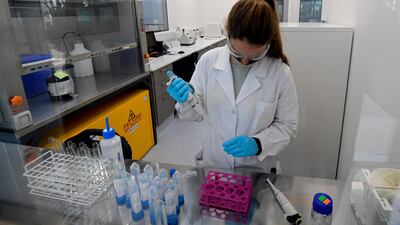Oxford University’s coronavirus vaccine triggers an immune response in both young and old, pharmaceutical firm AstraZeneca said on Monday.
The Oxford-AstraZeneca partnership is seen as a front-runner in the global hunt for a jab that ends the Covid-19 pandemic.
The company said early results from the trial suggested the elderly - the group most vulnerable to serious illness or death from coronavirus - could build up immunity.
The Financial Times reported that the vaccine triggered protective antibodies and T-cells in older age groups.
Immunogenicity blood tests carried out on a subset of older participants echo data released in July, which showed the vaccine generated “robust immune responses” in a group of healthy adults aged between 18 and 55.
An AstraZeneca spokesman said: “It is encouraging to see immunogenicity responses were similar between older and younger adults and that reactogenicity was lower in older adults, where the Covid-19 disease severity is higher.
“The results further build the body of evidence for the safety and immunogenicity of AZD1222.”
Details of the finding are expected to be published shortly in a clinical journal, it was reported.
The positive results come as the professor leading the trial said NHS workers and high-risk patients were likely to receive the vaccine before the end of the year.
Prof Adrian Hill said it was possible for vulnerable groups to receive the jab while trials were still under way - but only if the vaccine was granted emergency approval.
This would pave the way for a 2021 rollout, he said.
"I'd be very surprised if [the pandemic] isn't very clearly on the way down by late spring, at least in this country ... we will get to the stage where there is herd immunity through vaccination," he told the Daily Mail.
However, Health Secretary Matt Hancock poured cold water on claims that NHS staff could be vaccinated within weeks.
Asked on BBC Radio 4's Today programme if some people could receive a vaccine this year, he said: "I don't rule that out but that is not my central expectation.
“I would expect the bulk of the roll out to be in the first half of next year.
"We want to be ready in case everything goes perfectly but it's not my central expectation that we'll be doing that this year but the programme is progressing well, we're not there yet."
On Sunday, World Health Organisation head Tedros Adhanom Ghebreyesus called on rich countries to ensure poorer nations received fair access to coronavirus vaccines.
He said the only way to recover from the pandemic was together and by making sure immunisation rates were high among poorer countries as well.













